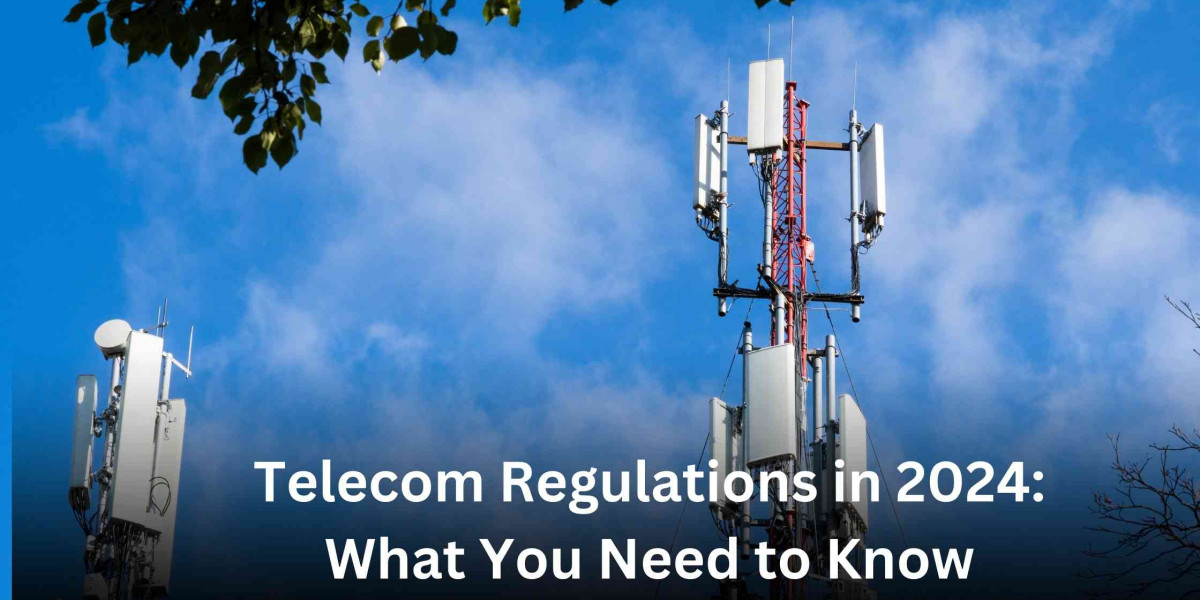The telecom industry is one of the most important sectors in today’s world. It connects people, businesses, and governments, ensuring smooth communication through phone calls, internet services, and data transfer. As technology evolves, so do the rules that govern this industry. In 2024, telecom regulations are undergoing significant changes, driven by advancements like 5G, data privacy concerns, and the need for greater network security.
This blog will break down key telecom regulations for 2024, what they mean for consumers and businesses, and why these regulations are important for the future of communication.
1. The Push for 5G and Spectrum Allocation
5G technology is transforming how we use the internet, offering faster download speeds and enabling new technologies like autonomous vehicles and smart cities. However, deploying 5G networks requires access to the electromagnetic spectrum, which is the range of radio frequencies used for communication.
In 2024, many countries are introducing new rules around the allocation of this spectrum to ensure that telecom companies can continue to expand 5G coverage. Governments are auctioning off spectrum licenses, and companies that win these licenses must adhere to strict rules about how they use the spectrum. These regulations ensure fair competition and prevent any one company from monopolizing access to critical communication channels.
Telecom operators also need to obtain an Access Service License, which allows them to provide basic telephone services, wireless access, and other communication services to the public. This license is crucial for ensuring that telecom companies meet regulatory standards and provide reliable services to customers.
What It Means for Consumers and Businesses:
As more companies roll out 5G, consumers can expect faster internet speeds and more reliable connections. Businesses will benefit from improved network infrastructure, enabling more advanced technologies and boosting productivity. However, the high costs of spectrum licenses and the Access Service License Registration may lead to increased prices for telecom services.
2. Data Privacy and Protection
With the growing amount of personal data shared over telecom networks, data privacy has become a major concern. In 2024, regulations are tightening to protect consumer information, ensuring that telecom companies handle data responsibly.
New data privacy laws require telecom providers to implement stronger measures for securing personal data. These include:
- Increased transparency: Telecom companies must clearly inform users about how their data is being collected, used, and shared.
- User consent: Customers must give explicit consent before their data can be collected or shared with third parties.
- Data breaches: Companies are now required to report any data breaches immediately and take steps to mitigate the damage.
Regulations like Europe’s General Data Protection Regulation (GDPR) are being adapted in many regions to ensure data security across borders. This means telecom companies operating globally will need to comply with stricter rules, regardless of where their customers are located.
What It Means for Consumers and Businesses:
Consumers will have more control over their personal data and how it’s used. For businesses, this means investing in stronger security systems and ensuring compliance with data protection laws, which could increase operational costs. Additionally, companies that provide international services through IPLC licenses in telecom (International Private Leased Circuits) must ensure that they meet cross-border data privacy standards, as these licenses involve the transfer of data between countries.
3. Net Neutrality Rules
Net neutrality is a principle that says internet service providers (ISPs) must treat all data on the internet equally. They should not discriminate or charge differently by user, content, website, or platform. In the past, some ISPs have tried to charge more for faster access to certain websites or services.
In 2024, many countries are revisiting their net neutrality regulations to ensure fair access to the internet. Some regions are strengthening these rules, while others are loosening them, allowing ISPs to offer “premium” internet services at a higher cost.
What It Means for Consumers and Businesses:
For consumers, strong net neutrality rules ensure equal access to all online services without additional charges. If these rules are relaxed, some users may have to pay more for faster internet speeds or access to certain websites. For businesses, especially startups and smaller companies, a fair internet playing field ensures that they can compete with larger firms without needing to pay extra for better service. Companies offering Network License Services must ensure that they comply with the relevant net neutrality regulations to maintain a fair service.
4. Cybersecurity and Telecom Networks
With more devices connected to telecom networks, the risk of cyberattacks has increased. Hackers can target telecom infrastructure, causing network disruptions or stealing sensitive information.
In response, governments are implementing stricter cybersecurity regulations in 2024. Telecom companies must now follow tougher rules to protect their networks from attacks. These regulations include:
- Network security assessments: Telecom providers must regularly assess the security of their networks and fix any vulnerabilities.
- Incident reporting: If a cyberattack occurs, companies must quickly report it to authorities and customers.
- Vendor restrictions: Some countries are restricting the use of certain foreign-made telecom equipment due to national security concerns.
What It Means for Consumers and Businesses:
Consumers can expect more secure telecom networks, reducing the risk of data theft or service outages. For businesses, these new regulations mean investing in cybersecurity measures to protect their networks and data. Failure to comply could lead to heavy fines or loss of operating licenses. For telecom operators handling DPL license registration (Domestic Private Leased Circuits), it is crucial to ensure their private networks are secure and meet regulatory standards for data protection and network safety.
5. Universal Service Obligation (USO)
The Universal Service Obligation (USO) is a regulation that ensures telecom services are accessible to everyone, including those in remote or underserved areas. In 2024, governments are renewing their commitment to bridging the digital divide, ensuring that rural areas have access to reliable communication networks.
Telecom providers are now required to extend their networks to these areas, even if it’s not profitable. Governments may offer subsidies or incentives to encourage companies to invest in rural infrastructure.
What It Means for Consumers and Businesses:
Consumers in rural or remote areas will benefit from better access to telecom services like mobile networks and broadband internet. For telecom companies, expanding into these areas may require significant investment, but government incentives can help offset the costs. Network License Services are often critical in extending infrastructure to underserved areas, ensuring universal access to telecom services.
6. Environmental Regulations for Telecom
As environmental concerns grow, telecom companies are facing pressure to reduce their carbon footprint. In 2024, new regulations are being introduced to ensure that telecom infrastructure is built and operated in an environmentally sustainable way.
These regulations focus on:
- Energy efficiency: Telecom companies must use energy-efficient technologies and reduce energy consumption in their operations.
- E-waste management: Companies are required to recycle or properly dispose of old telecom equipment to reduce electronic waste.
- Green technology: Governments are encouraging the use of renewable energy sources, like solar or wind, to power telecom infrastructure.
What It Means for Consumers and Businesses:
For consumers, eco-friendly telecom operations could mean lower service costs in the long run as companies save on energy expenses. Businesses in the telecom sector will need to invest in green technologies and comply with stricter environmental laws, but they can also benefit from government incentives for sustainable practices.
Conclusion
Telecom regulations in 2024 are evolving to meet the challenges of a rapidly changing industry. From the expansion of 5G and the Access Service License requirements to stricter data privacy rules and the growing importance of cybersecurity, these regulations are designed to protect consumers, ensure fair competition, and promote innovation.
For companies involved in IPLC licenses in telecom, DPL license registration, and Network License Services, understanding and complying with these new rules is essential. As technology continues to advance, staying informed about these regulations is crucial for both consumers and businesses.
Understanding these changes will help everyone prepare for the future of communication in a fast-paced, tech-driven society.
Read more Blogs – Wpc license registration for Import








